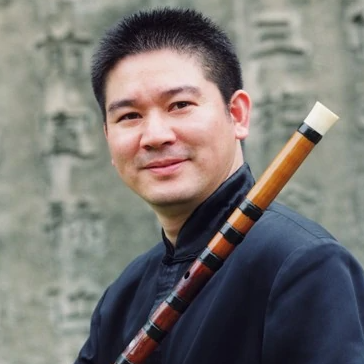Daya

Dai Ya, born in Dongyang, Zhejiang in 1964, began to learn the flute at the age of seven, and learned from the master of the flute Mr. Zhao Songting at the age of nine. In 1977, he was admitted to Zhejiang Provincial Art School. In 1981, he won the first prize in the "Spring of the West Lake" flute competition in Hangzhou.
In 1982, he was assigned to the Hangzhou Song and Dance Troupe as a solo performer. In 1986, he was admitted to the Central Conservatory of Music and successively studied under the famous flute players Zeng Yongqing and Liu Guanle. After graduating in 1990, he stayed at the school to teach.
He is currently the director and doctoral tutor of the Wind Music Teaching and Research Section of the Folk Music Department of the Central Conservatory of Music. He is also a member of the Chinese Musicians Association, the executive director of the Chinese National Orchestra Society, the vice president of the Chinese Bamboo Flute Society, and a member of the Hong Kong Buddhist Cultural Industry Buddhist Music Committee.
He has performed with the world-famous Swedish National Symphony Orchestra, Malmo Symphony Orchestra, British ADDITTY String Quartet, Italian XENIA EESEMBLE String Quartet, Netherlands New Music Ensemble, China National Symphony Orchestra, Central Opera House Symphony Orchestra, Shanghai Symphony Orchestra, Shanghai Philharmonic Orchestra, Hangzhou Philharmonic Symphony Orchestra, Chinese Orchestra of Central Conservatory of Music, Central Chinese Orchestra, China Radio Chinese Orchestra, Hong Kong Chinese Orchestra, Taipei City Chinese Orchestra, Singapore Chinese Orchestra, Macao Chinese Orchestra, etc. He has performed flute solo and concerto concerts, and has gained a high reputation at home and abroad. In 2009, the first concert of Dizi Concerto was held nationwide. In addition, the "Song of the Dragon - Daiya Dizi Solo Concert Series" has been launched successively across the country.
He has been invited by the Royal Swedish Academy of Music, the Gothenburg Academy of Music, the Hong Kong Academy for Performing Arts, the Macau Academy for Performing Arts, the Singapore Arts Council and domestic institutions to hold master class lectures, performances and other activities. He has compiled "Central Conservatory of Music Dizi Examination Materials" (domestic and overseas versions), "Chinese Music Association Dizi Examination Materials", "Dizi Music Expo", and authored "Three-Five-Seven Appreciation", "The Charm of Erfan" and "The Joy of Shepherd Boys". Music Analysis" and other papers.
Mr. Zhao Songting had the idea of developing the flute into a porous shape during his lifetime. Adhering to the legacy of his mentor, Dai Ya, in close cooperation with the composers, after nearly 20 years of research and repeated practice, boldly used improvements in performance. The eight-hole flute expands the scale and makes the scale more perfect, thus opening up a new field for the flute to better meet the various needs of soloists, concertos and composers in the new era. In 2000, he wrote "Practice and Thinking of Cooperation between Chinese Bamboo Flute and Western Orchestra", thinking about the development prospect of the eight-hole flute from the perspective of theory. In 2008, he completed the book "Eight-hole flute - the application course of the newly improved bamboo flute", which made the training and performance of the eight-hole flute a complete standard system and contributed to the development of the flute.
Dai Ya has recorded several CD albums of flute albums, and has recorded a large number of solo pieces for flute, xiao, xun, bau and pan flute for many record companies and published them. There are "Chu Soul", "Sorrowful Empty Mountain", "Flowers on the Moshang", "Bangdi Concerto", "Gone with the Wind", "Fantasy of Shepherd Boys", "Four Chapters in Northern Shaanxi", "Hu Xuan Dance", "Diya Dizi Solo and Concerto Live Version" DVD" collection, etc. He is committed to the development of the flute concerto. Since graduating from university in 1990, he has worked closely with professional composers, striving to make the performance of the Chinese bamboo flute continue to develop in a high-grade and high-end direction, filling the gaps in the large-scale flute repertoire; The Dizi Concerto was widely disseminated by his premiere.
Some of these works have been included in the undergraduate and postgraduate courses of the Conservatory of Music. The concertos "Flowers on the Mo" and "Hu Xuan Dance" have been designated as the required pieces for the "Golden Bell Award" and the flute finals of the Taiwan Concerto Competition respectively. In 2009, Dai Ya held a special concert for the flute concerto in the country for the first time. .
In Dai Ya's world of bamboo flute art, you can find the fiery fiery "Qinchuan Love", hear the crisp and cheerful singing of "Birds in the Shade", and appreciate the deep, soothing, worrying and not-so-darkness of "Partridge Flying". Injury, feel the warm, rough, smooth and gorgeous "Three Five Seven", appreciate the bright Jiangnan style in "Happy Song", and browse the elegant and beautiful scenery of the ancient city in "Gusu Xing".
Similar artist
Involving musical instruments
Involved portfolio
Involved news
Popular artists
- 01 Zhang Xiuyan
- 02 Zhang Gaoxiang
- 03 Wang Xianhong
- 04 King Hammer
- 05 Chen Jiaqi
 渝公网安备 50010702504639号
渝公网安备 50010702504639号